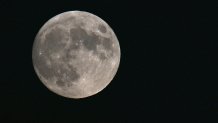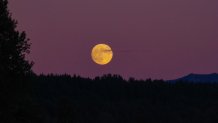The second supermoon of the year will brighten up the sky this week and herald the start of the summer season.
Here's what to know if you're sky-watching in Southern California.

What is the strawberry supermoon?
Get top local stories in Southern California delivered to you every morning. Sign up for NBC LA's News Headlines newsletter.
The strawberry supermoon comes as the moon's orbit will be at its closest distance to earth, causing the moon the appear larger and brighter.
A supermoon can appear up to 30% brighter and 17% larger than the faintest Moon of the year, which occurs when it’s farthest from Earth in its orbit, according to NASA.
It will be 222,098 miles from Earth, while the average distance from a regular moon and Earth is 240,000 miles.
Local
Get Los Angeles's latest local news on crime, entertainment, weather, schools, COVID, cost of living and more. Here's your go-to source for today's LA news.
The supermoon started to appear full on Sunday night and will reach full illumination Tuesday at 7:53 p.m. on the East Coast.
Why is June the strawberry moon?
The month's supermoon is known as the strawberry supermoon, according to the Farmer's Almanac, "because the fruit is ready to be gathered during the month."
The name was first used by the Algonquin Native American tribes in the Northern U.S to mark the time that the berries are ripe and ready to be gathered.
While the name may include the bright red fruit, it has nothing to do with the moon's appearance. A supermoon will have an orange or red tint only when it is closer to the horizon because the moon's light has to pass through more air.

Where can I see the Strawberry Supermoon?
Be ready to step outside and gaze the night sky as the moon will go into perigee and be at it's fullest at 7:23 p.m. EDT.
The best time to view the supermoon in Los Angeles will be when the moon rises at 8:56 p.m. PDT. You might also try moonset early Wednesday morning.
If you prefer watching from the comfort of your home, the Virtual Telescope Project will host a free live stream of the moon as it rises over the monuments of Rome. The webcast will start at 3:15 p.m. EDT.



